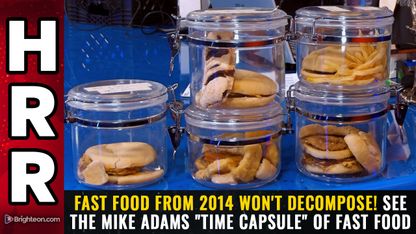
"Theft is an issue. It's higher than what it has historically been," Walmart CEO Doug McMillon said during a Dec. 6 appearance on the CNBC program "Squawk Box."
"If that's not corrected over time, prices will be higher and/or stores will close."
McMillon said that Walmart uses a "city by city, location by location" approach when it comes to retail thefts.
"It's store managers working with local law enforcement, and we've got great relationships there for the most part. I think local law enforcement being staffed and being a good partner is part of that equation, and that's normally how we approach it. We've [also] got safety measures [and] security measures that we've put in place by store location."
Walmart is not the only big-box retailer dealing with a rise in shoplifting cases. Its rival Target recorded more than $400 million in losses, an observation company CFO Michael Fiddelke attributed to shoplifting – which also saw a 50 percent jump year over year.
"At Target, year-to-date, incremental shortage has already reduced our gross margin by more than $400 million versus last year," Fiddlke said during an earnings call.
"We expect it will reduce our gross margin by more than $600 million for the full year. This is an industrywide problem that is often driven by criminal networks." (Related: Target lost $600 million in profits this year due to shoplifting and looting.)
Target COO John Mulligan concurred with Fiddelke's statements, saying that the retail losses were primarily driven by organized crime.
"It started probably in some localized geographies originally, but we see those circles expanding and the impact continuing to grow," Mulligan said.
McMillon: Lax responses from prosecutors play a role in worsening retail crime
According to McMillon, a lax approach from prosecutors plays a role in retail crime. His remarks ring true in the case of California, a state that has seen many establishments close due to retail crime. Making things worse for the Golden State, however, is a law that enables this practice.
El Dorado County District Attorney (DA) Vern Pierson warned that shoplifting in California is out of control, thanks to the soft-on-crime policies. During an appearance on the EpochTV program "California Insider," Pierson cited Proposition 47 as the culprit for enabling retail theft. It was passed by voters in 2014 as part of a "criminal justice reform" program backed by progressives.
Proposition 47 downgraded certain thefts and drug offenses from felonies to misdemeanors. It also permitted currently imprisoned felons to petition for re-sentencing under the new classifications. Those who have already served jail time can also have their past convictions reclassified as misdemeanors.
Proposition 47's most well-known statute raised the minimum amount of stolen goods to be classified as a felony from $400 to $950. This statute, critics argued, was the main cause of a spike in petty theft across the Golden State.
"The practical reality is that most retailers have learned if they call law enforcement for a theft of less than $950, [police officers] will not respond," said Pierson. "If they respond at most, what they will do is issue a citation [for court appearance]," which the DA said amounts to nothing as most theft suspects do not show up.
Because of this, most businesses in California have a policy that prevents employees from reporting low-level property crimes. Some stores, Pierson added, completely stopped reporting petty theft altogether as the police can't do much. To make things worse, Proposition 47 empowered robbery suspects to sue establishments if store employees physically confront suspects while in the act.
"We're a very litigious society here in California," the DA said. "The stores and their insurance carriers really are afraid of being sued for trying to stop a crime that has little to no consequence."
Watch this video about San Francisco businesses being forced to close down due to rampant shoplifting.
This video is from the Recharge Freedom channel on Brighteon.com.
More related stories:
Walgreens closing 5 more San Francisco stores due to organized shoplifting.
San Francisco retail stores cease operations thanks to new law that decriminalizes shoplifting.
California DA: SHOPLIFTING in the Golden State is out of control, soft-on-crime policies to blame.=
Sources include:
Please contact us for more information.


















